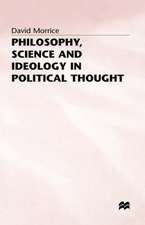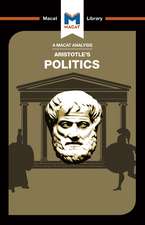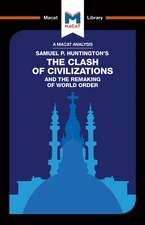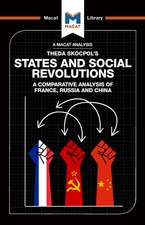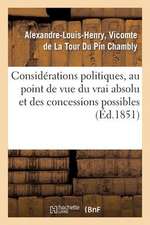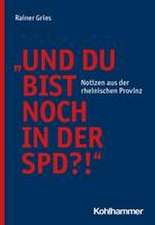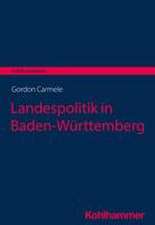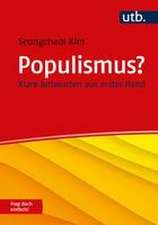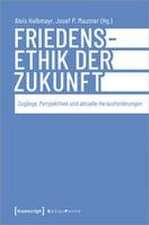An Analysis of Kenneth Waltz's Theory of International Politics: The Macat Library
Autor Riley Quinn, Bryan Gibsonen Limba Engleză Paperback – 15 iul 2017
Waltz's book begins by testing and critiquing earlier theories of international relations, showing their strengths and weaknesses, before moving on to argue for his own stance - what has since become known as "neorealism". His aim was "to construct a theory of international politics that remedies the defects of present theories." And this is precisely what he did; by showing the shortcomings of the prevalent theories of international relations, Waltz was then able to import insights from sociology to create a more comprehensive and realistic theory that took full account of the strengths of old schemas while also remedying their weaknesses - reasoning out a new theory in the process.
| Toate formatele și edițiile | Preț | Express |
|---|---|---|
| Paperback (1) | 47.27 lei 3-5 săpt. | +4.82 lei 6-12 zile |
| Macat Library – 15 iul 2017 | 47.27 lei 3-5 săpt. | +4.82 lei 6-12 zile |
| Hardback (1) | 125.33 lei 6-8 săpt. | |
| Macat Library – 15 iul 2017 | 125.33 lei 6-8 săpt. |
Din seria The Macat Library
-
 Preț: 47.29 lei
Preț: 47.29 lei -
 Preț: 47.49 lei
Preț: 47.49 lei -
 Preț: 47.18 lei
Preț: 47.18 lei -
 Preț: 49.34 lei
Preț: 49.34 lei -
 Preț: 47.42 lei
Preț: 47.42 lei -
 Preț: 47.20 lei
Preț: 47.20 lei -
 Preț: 46.98 lei
Preț: 46.98 lei -
 Preț: 47.37 lei
Preț: 47.37 lei -
 Preț: 47.29 lei
Preț: 47.29 lei -
 Preț: 47.30 lei
Preț: 47.30 lei -
 Preț: 47.23 lei
Preț: 47.23 lei -
 Preț: 64.07 lei
Preț: 64.07 lei -
 Preț: 47.30 lei
Preț: 47.30 lei -
 Preț: 47.23 lei
Preț: 47.23 lei -
 Preț: 47.18 lei
Preț: 47.18 lei - 30%
 Preț: 32.99 lei
Preț: 32.99 lei -
 Preț: 47.13 lei
Preț: 47.13 lei -
 Preț: 47.23 lei
Preț: 47.23 lei -
 Preț: 47.26 lei
Preț: 47.26 lei -
 Preț: 47.65 lei
Preț: 47.65 lei -
 Preț: 47.37 lei
Preț: 47.37 lei -
 Preț: 47.08 lei
Preț: 47.08 lei -
 Preț: 47.18 lei
Preț: 47.18 lei -
 Preț: 47.18 lei
Preț: 47.18 lei -
 Preț: 47.99 lei
Preț: 47.99 lei -
 Preț: 47.23 lei
Preț: 47.23 lei -
 Preț: 47.02 lei
Preț: 47.02 lei -
 Preț: 47.23 lei
Preț: 47.23 lei -
 Preț: 47.42 lei
Preț: 47.42 lei -
 Preț: 47.30 lei
Preț: 47.30 lei -
 Preț: 47.13 lei
Preț: 47.13 lei -
 Preț: 47.10 lei
Preț: 47.10 lei -
 Preț: 47.20 lei
Preț: 47.20 lei -
 Preț: 46.98 lei
Preț: 46.98 lei -
 Preț: 47.08 lei
Preț: 47.08 lei -
 Preț: 47.29 lei
Preț: 47.29 lei -
 Preț: 47.15 lei
Preț: 47.15 lei -
 Preț: 47.29 lei
Preț: 47.29 lei -
 Preț: 64.24 lei
Preț: 64.24 lei -
 Preț: 46.98 lei
Preț: 46.98 lei -
 Preț: 47.40 lei
Preț: 47.40 lei -
 Preț: 47.87 lei
Preț: 47.87 lei -
 Preț: 47.42 lei
Preț: 47.42 lei -
 Preț: 47.33 lei
Preț: 47.33 lei -
 Preț: 47.40 lei
Preț: 47.40 lei -
 Preț: 47.40 lei
Preț: 47.40 lei -
 Preț: 46.98 lei
Preț: 46.98 lei -
 Preț: 47.20 lei
Preț: 47.20 lei -
 Preț: 47.21 lei
Preț: 47.21 lei
Preț: 47.27 lei
Nou
9.04€ • 9.44$ • 7.49£
Carte disponibilă
Livrare economică 14-28 martie
Livrare express 27 februarie-05 martie pentru 14.81 lei
Specificații
ISBN-10: 1912127075
Pagini: 112
Dimensiuni: 129 x 198 x 9 mm
Greutate: 0.12 kg
Ediția:1
Editura: Macat Library
Colecția Macat Library
Seria The Macat Library
Cuprins
Notă biografică
Bryan Gibson is a diplomatic historian, who completed his PhD thesis, entitled, 'U.S. Foreign Policy, Iraq, and the Cold War, 1958-75,' at the LSE's International History Department.
Descriere
Kenneth Waltz's 1979 Theory of International Politics is credited with bringing about a "scientific revolution" in the study of international relations - bringing the field into a new era of systematic study. The book is also a lesson in reasoning carefully and critically. Good reasoning is exemplified by arguments that move systematically, through carefully organised stages, taking into account opposing stances and ideas as they move towards a logical conclusion. Theory of International Politics might be a textbook example of how to go about structuring an argument in this way to produce a watertight case for a particular point of view.
Waltz's book begins by testing and critiquing earlier theories of international relations, showing their strengths and weaknesses, before moving on to argue for his own stance - what has since become known as "neorealism". His aim was "to construct a theory of international politics that remedies the defects of present theories." And this is precisely what he did; by showing the shortcomings of the prevalent theories of international relations, Waltz was then able to import insights from sociology to create a more comprehensive and realistic theory that took full account of the strengths of old schemas while also remedying their weaknesses - reasoning out a new theory in the process.

